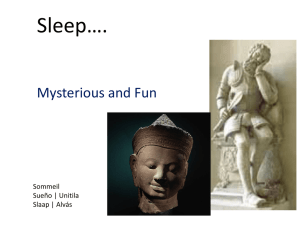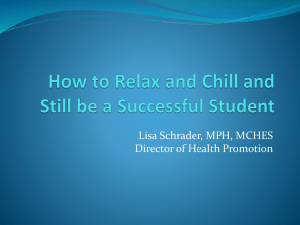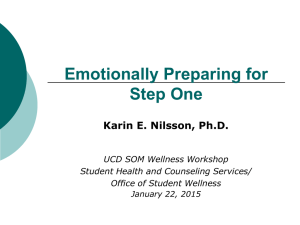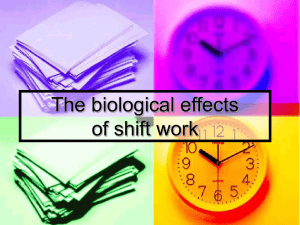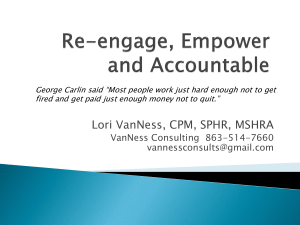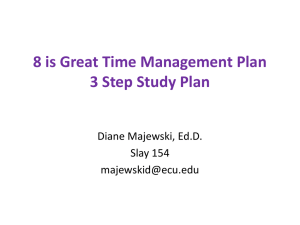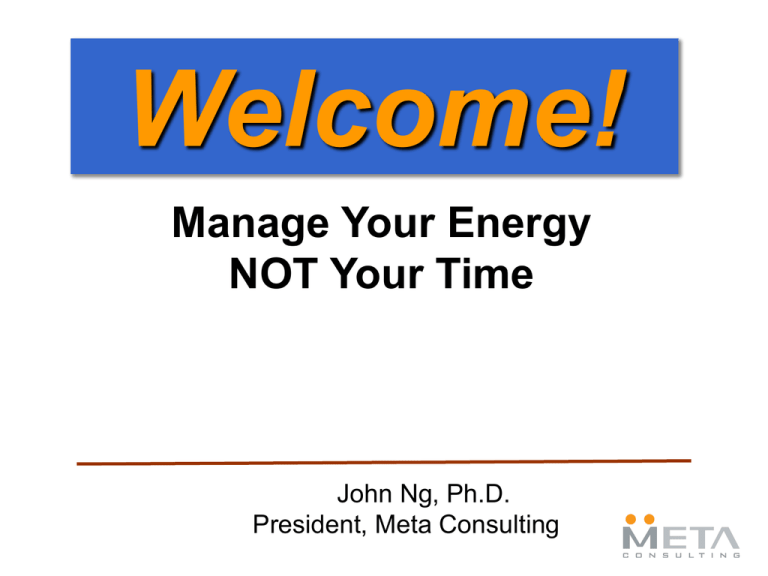
Welcome!
Manage Your Energy
NOT Your Time
John Ng, Ph.D.
President, Meta Consulting
Approach
1.
Integrated, holistic approach: Psychology,
Management, Therapy & Family Perspectives
2.
Help recognize participants the need for
energy management
What I hear, I forget.
What I see, I remember.
What I do becomes a part of me.
吾听吾忘,
吾见吾记,
吾做吾悟。
孔子《中庸》
SESSION
Managing Your Energy NOT Your Time
Questions for YOU
1. Why do we need to manage our energy?
2. Why is energy management more important
than time management?
3. How have I manage my energy effectively?
4. What depletes my energy?
Session
Managing Your Energy NOT Your Time
•
Time Management vs Energy Management
“No time vs No energy, if we have energy,
we have time”
•
When we have no energy,
• work not done,
• work gets procrastinated,
• work done sloppily & have to be redone
•
Finding Energy Energizer & Energy Depleter
• What energizes you?
(Me: Watching soccer & Wife: Doing
housework!)
• What depletes you?
Session
Managing Your Energy NOT Your Time
Mihaly Csikszentmihalyi
“FLOW is a feeling when researchers experience a
breakthrough in their experiments, when engineers
find the solution to a protracted problem, when
speakers sense the energy of the crowd during a
climax, or when leaders evoke the enthusiastic
responses of their staff at their annual conference”
Session
Managing Your Energy NOT Your Time
Mihaly Csikszentmihalyi
1. FLOW as optimal experience
2. FLOW in breakthroughs
3. FLOW in unfavorable situations: Cancer patients
4. FLOW in ordinary situations
5. FLOW in ideas and practices
Session
Managing Your Energy NOT Your Time
Flow Matters
“Flow does not happen just in favorable outcomes. Cancer
patient experiences a deep sense of peace.
Simple events as song of a bird in the forest, or violinist in
midst of mastering an intricate piece or when social worker
shares a piece of bread with the most deprived in Calcutta.”
Session
Managing Your Energy NOT Your Time
MANAGING PERSONAL ENERGY
1. Rekindling our passion – Nurturing our ‘FLOW’
Physical Energy
2. Recharging our physical energy – Learn to rest
well & find energy energizer
Emotional Energy
3. Recognizing our own energy source –
Understanding our ‘personality’ type
4. Reexamining your attitudes – Reframing life’s
successes and failures
MANAGING PERSONAL ENERGY
Mental Energy
5. Retooling our competence – Own our learning
development
Social Energy
6. Rebuilding your relationships – Managing around
your conflicts
7. Reprioritizing your family life – Taking charge of
family again
MANAGING PERSONAL ENERGY
Spiritual Energy
8. Rediscovering new challenges - Matching our
jobs with fresh challenges
MANAGING PERSONAL ENERGY
Mihaly Csikszentmihalyi,
“Optimal experience is something
that we make happen.
1. Rekindling our passion – Nurturing our ‘voice’
* Doing work without passion is drudgery and drag!
(Shun’s story)
•Find your ‘voice’: Staff are more creative,
competence & capacity than their job require but are
untapped or under-tapped!
Session
Managing Your Energy not Your Time
MANAGING PERSONAL ENERGY
Physical Energy: Energy that is derived from
nutrition, sleep, exercise & rest. Inadequate aspects
of each of these diminish our basic energy level,
which will affect our ability to manage our other
sources of energy.
• Most adults need 7-9 hours of sleep per night. On
average, working adults between 30-64 years old
received less than 6 hours of sleep within a 24hour period.
Session
Managing Your Energy not Your Time
MANAGING PERSONAL ENERGY
2. Recharging our physical energy – Learn to rest
well & find energy energizer
Session
Managing Your Energy not Your Time
10 Surprising and Serious Effects of the
Lack of Sleep (WebMD)
1. Sleepiness causes accidents
1. Sleep Loss Dumbs You Down
3. Sleep Deprivation Can Lead to Serious Health
Problems
4. Lack of Sleep Kills Sex Drive
5. Sleepiness Is Depressing
Session
Managing Your Energy not Your Time
10 Surprising and Serious Effects of the
Lack of Sleep (WebMD)
6. Lack of Sleep Ages Your Skin
7. Sleepiness Makes You Forgetful
8. Losing Sleep Can Make You Gain Weight
9. Lack of Sleep May Increase Risk of Death
10. Sleep Loss Impairs Judgment, Especially About
Sleep
Is Sleepiness Hurting You? Survey
http://www.webmd.com/sleep-disorders/quizSession
Managing Your Energy not Your Time
sleepiness-excessive
MANAGING PERSONAL ENERGY
1. Sleepiness causes accidents
The National Highway Traffic Safety Administration
estimates that fatigue is a cause in 100,000 auto
crashes and 1,550 crash-related deaths a year in the
U.S. The problem is greatest among people under
25 years old.
Studies show that sleep loss and poor-quality sleep
also lead to accidents and injuries on the job. In one
study, workers who complained about excessive
daytime sleepiness had significantly more work
accidents,
Session particularly repeated work accidents.
Managing Your Energy not Your Time
They also had more sick days per accident.
MANAGING PERSONAL ENERGY
2. Sleep Loss Dumbs You Down
Sleep plays a critical role in thinking and learning.
Lack of sleep hurts these cognitive processes in
many ways. First, it impairs attention, alertness,
concentration, reasoning, and problem solving.
Makes more difficult to learn efficiently.
They also had more sick days per accident.
Session
Managing Your Energy not Your Time
MANAGING PERSONAL ENERGY
3. Sleep Deprivation Can Lead to Serious Health
Problems
Sleep disorders and chronic sleep loss can put you
at risk for:
• Heart disease
• Heart attack
• Heart failure
• Irregular heartbeat
• High blood pressure
• Stroke
• Diabetes
Session
Managing Your Energy not Your Time
MANAGING PERSONAL ENERGY
4. Lack of Sleep Kills Sex Drive
Sleep specialists say that sleep-deprived men and
women report lower libidos and less interest in sex.
Depleted energy, sleepiness, and increased tension
may be largely to blame.
Session
Managing Your Energy not Your Time
MANAGING PERSONAL ENERGY
4. Lack of Sleep Kills Sex Drive
For men with sleep apnea, a respiratory problem
that interrupts sleep, there may be another factor in
the sexual slump. A study published in the Journal of
Clinical Endocrinology & Metabolism in 2002
suggests that many men with sleep apnea also have
low testosterone levels. In the study, nearly half of
the men who suffered from severe sleep apnea also
secreted abnormally low levels of testosterone
during the night.
Session
Managing Your Energy not Your Time
MANAGING PERSONAL ENERGY
5. Sleepiness Is Depressing
Over time, lack of sleep and sleep disorders can
contribute to symptoms of depression. In a 2005
Sleep in America poll, people diagnosed with
depression or anxiety were more likely to sleep less
than six hours at night.
Insomnia, has the strongest link to depression. In a
2007 study of 10,000 people, those with insomnia
were five times as likely to develop depression as
those without. Insomnia is often one of the first
symptoms
Session of depression.
Managing Your Energy not Your Time
MANAGING PERSONAL ENERGY
5. Sleepiness Is Depressing
Insomnia and depression feed on each other. Sleep
loss often aggravates the symptoms of depression,
and depression can make it more difficult to fall
asleep. On the positive side, treating sleep problems
can help depression and its symptoms, and vice
versa.
Session
Managing Your Energy not Your Time
MANAGING PERSONAL ENERGY
6. Lack of Sleep Ages Your Skin
Most people have experienced sallow skin and puffy
eyes after a few nights of missed sleep. But it turns
out that chronic sleep loss can lead to lackluster
skin, fine lines, and dark circles under the eyes.
When you don’t get enough sleep, your body
releases more of the stress hormone cortisol. In
excess amounts, cortisol can break down skin
collagen, the protein that keeps skin smooth and
elastic.
Session
Managing Your Energy not Your Time
MANAGING PERSONAL ENERGY
6. Lack of Sleep Ages Your Skin
Sleep loss also causes the body to release too little
human growth hormone. When we’re young, human
growth hormone promotes growth. As we age, it
helps increase muscle mass, thicken skin, and
strengthen bones.
Session
Managing Your Energy not Your Time
MANAGING PERSONAL ENERGY
6. Lack of Sleep Ages Your Skin
“It’s during deep sleep -- what we call slow-wave
sleep -- that growth hormone is released,” says
sleep expert Phil Gehrman, PhD. “It seems to be
part of normal tissue repair -- patching the wear and
tear of the day.”
Session
Managing Your Energy not Your Time
MANAGING PERSONAL ENERGY
7. Sleepiness Makes You Forgetful
Trying to keep your memory sharp? Try getting
plenty of sleep.
In 2009, American and French researchers
determined that brain events called “sharp wave
ripples” are responsible for consolidating memory.
The ripples also transfer learned information from
the hippocampus to the neocortex of the brain,
where long-term memories are stored. Sharp wave
ripples occur mostly during the deepest levels of
sleep.
Session
Managing Your Energy not Your Time
MANAGING PERSONAL ENERGY
8. Losing Sleep Can Make You Gain Weight
When it comes to body weight, it may be that if you
snooze, you lose. Lack of sleep seems to be related
to an increase in hunger and appetite, and possibly
to obesity. According to a 2004 study, people who
sleep less than six hours a day were almost 30
percent more likely to become obese than those who
slept seven to nine hours.
Session
Managing Your Energy not Your Time
MANAGING PERSONAL ENERGY
8. Losing Sleep Can Make You Gain Weight
Recent research has focused on the link between
sleep and the peptides that regulate appetite.
“Ghrelin stimulates hunger and leptin signals satiety
to the brain and suppresses appetite,” says Siebern.
“Shortened sleep time is associated with decreases
in leptin and elevations in ghrelin.”
Session
Managing Your Energy not Your Time
MANAGING PERSONAL ENERGY
8. Losing Sleep Can Make You Gain Weight
Not only does sleep loss appear to stimulate
appetite. It also stimulates cravings for high-fat, highcarbohydrate foods. Ongoing studies are
considering whether adequate sleep should be a
standard part of weight loss programs.
Session
Managing Your Energy not Your Time
MANAGING PERSONAL ENERGY
9. Lack of Sleep May Increase Risk of Death
In the “Whitehall II Study,” British researchers looked
at how sleep patterns affected the mortality of more
than 10,000 British civil servants over two decades.
The results, published in 2007, showed that those
who had cut their sleep from seven to five hours or
fewer a night nearly doubled their risk of death from
all causes. In particular, lack of sleep doubled the
risk of death from cardiovascular disease.
Session
Managing Your Energy not Your Time
MANAGING PERSONAL ENERGY
10. Sleep Loss Impairs Judgment, Especially
About Sleep
Sleep-deprived people seem to be especially prone
to poor judgment when it comes to assessing what
lack of sleep is doing to them. In our increasingly
fast-paced world, functioning on less sleep has
become a kind of badge of honor. But sleep
specialists say if you think you’re doing fine on less
sleep, you’re probably wrong.
Session
Managing Your Energy not Your Time
MANAGING PERSONAL ENERGY
10. Sleep Loss Impairs Judgment, Especially
About Sleep
Sleep-deprived people seem to be especially prone
to poor judgment when it comes to assessing what
lack of sleep is doing to them. In our increasingly
fast-paced world, functioning on less sleep has
become a kind of badge of honor. But sleep
specialists say if you think you’re doing fine on less
sleep, you’re probably wrong.
Session
Managing Your Energy not Your Time
MANAGING PERSONAL ENERGY
10. Sleep Loss Impairs Judgment, Especially
About Sleep
“Studies show that over time, people who are getting
six hours of sleep, instead of seven or eight, begin to
feel that they’ve adapted to that sleep deprivation -they’ve gotten used to it,” Gehrman says. “But if you
look at how they actually do on tests of mental
alertness and performance, they continue to go
downhill. So there’s a point in sleep deprivation
when we lose touch with how impaired we are.”
Session
Managing Your Energy not Your Time
Physical Energy: Energy that is derived
from sleep, rest, healthy food and exercise.
Using highly sensitive iPhone
accelerometer to track sounds and
movement throughout the night,
Sleep Cycle alarm clock analyzes
your sleep patterns and wakes you
in the lightest sleep phase for
maximum energy and relaxation
throughout the day.
Sleep Cycle not a cure for sleep
deprivation, but drastically
improves the sleep you do get and
the start of your day.
Session
Managing Your Energy NOT Your Time
Physical Energy: Sleep Cycle
Session
Managing Your Energy NOT Your Time
Emotional Energy
Emotional Energy: Energy that is derived from our
ability to control our emotions by understanding our
personality types and managing our emotions through
interpersonal neurobiology.
Finding your personality energy source!
MBTI: Extravert vs Introvert
Session
Managing Your Energy NOT Your Time
MANAGING PERSONAL ENERGY
3. Recognizing our own energy source –
Understanding our ‘personality’ type
Session
Managing Your Energy not Your Time
Introvert
5
4
3
2
Task
5
4
3
2
1
2
3
2
3
4
Extrovert
5
Session
Managing Your Energy not Your Time
4
5
degree to
which
we
Person
attribute
worth to
each other
Types of Energy: Emotional Energy
Emotional Energy: Energy that is derived from our
ability to control our emotions by understanding our
personality types and managing our emotions
through interpersonal neurobiology
•Understanding Brain Development
•Understanding Amygdala Hijack
Types of Energy: Emotional Energy
Relationship
(Sharing of information &
energy between two or more
persons)
Brain
Mind
(Processing of energy &
information)
(Regulation of the flow of
energy & Information)
Session
Managing Your Energy not Your Time
Types of Energy: Emotional Energy
“Experiences throughout life shapes the functioning
of the mind.”
“An adult’s preoccupation with own past e.g. how
she felt abandoned or how her father was
disappointed in her, can continually intrude itself onto
her present perceptions.”
Session
Managing Your Energy not Your Time
Types of Energy: Emotional Energy
Past experiences will determine our responses
to the present and future.
Unless we find value &meaning in past bad
experiences, we will always live through the past.
Session
Managing Your Energy not Your Time
MANAGING PERSONAL ENERGY
4. Reexamining your attitudes – Reframing life’s
successes and failures
•Find value & meaning in past failures (SIA IFS)
•Failure is only failure if we don’t recover.
•Success can become failure:
Types of Energy: Mental Energy
Mental Energy: Energy that is derived from
developing the different aspects of our mind
Discipline of our mind: “We are what we think & what
we think we are!”
•The Disciplined Mind
•The Synthesizing Mind
•The Creating Mind
•The Respectful Mind
•The Ethical Mind
Session
Managing Your Energy not Your Time
MANAGING PERSONAL ENERGY
5. Retooling our competence – Own our learning
development
•Grow your competence: Ask & coach
•“Eat like a bird” - Making learning a way of life
Session
Managing Your Energy not Your Time
Types of Energy: Social Energy
Social Energy: Energy that is derived from our
ability to enhance social and interpersonal
relationships. Inability to relate to people can
become a very serious source of energy depleter.
•John
Gottman: 5: 1 Principle
•Concept of ‘Bidding’
Session
Managing Your Energy not Your Time
Types of Energy: Social Energy
Concept of ‘Bidding’: Fundamental unit in human
connection, desire to make emotional connection
with others.
*3 types of responses:
*Positive
*Indifferent: Unintentional, few 2nd bid
*Negative:
*Climate plays an important part in conflict
management, despite close physical proximity.
Session
Session
3
Energy not Your Time
What Managing
are Types Your
of Energy
MANAGING PERSONAL ENERGY
6. Rebuilding your relationships – Managing around
your conflicts
7. Reprioritizing your family life – Taking charge of
family again
Types of Energy: Spiritual Energy
Spiritual Energy: Most people find energy when they find
meaning and purpose in what they do. This can be derived
from Sabbath keeping, divine, supernatural transformation
& encounters.
•
Purpose-driven life
•
Transformational living
Session
Managing Your Energy not Your Time
MANAGING PERSONAL ENERGY
8. Rediscovering new challenges - Discovering
fresh challenges in our vocation
•Finding fulfillment beyond ourselves – Nurturing
people
•Discovering purpose by serving meaningfully –
Serving the poor & disenfranchized
CONCLUSION:
LESSON FROM BEN ZANDER
Session
Managing Your Energy not Your Time
53
Thank You
for the Partnership!


